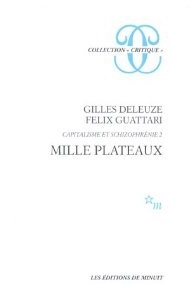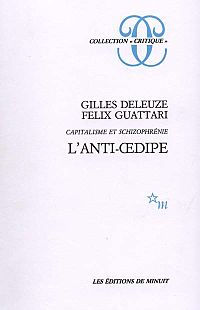
Gilles Louis René Deleuze was a French philosopher who, from the early 1950s until his death in 1995, wrote on philosophy, literature, film, and fine art. His most popular works were the two volumes of Capitalism and Schizophrenia: Anti-Oedipus (1972) and A Thousand Plateaus (1980), both co-written with psychoanalyst Félix Guattari. His metaphysical treatise Difference and Repetition (1968) is considered by many scholars to be his magnum opus.
Post-structuralism is a philosophical movement that questions the objectivity or stability of the various interpretive structures that are posited by structuralism and considers them to be constituted by broader systems of power. Although post-structuralists all present different critiques of structuralism, common themes among them include the rejection of the self-sufficiency of structuralism, as well as an interrogation of the binary oppositions that constitute its structures. Accordingly, post-structuralism discards the idea of interpreting media within pre-established, socially constructed structures.
The Sokal affair, additionally known as the Sokal hoax, was a demonstrative scholarly hoax performed by Alan Sokal, a physics professor at New York University and University College London. In 1996, Sokal submitted an article to Social Text, an academic journal of cultural studies. The submission was an experiment to test the journal's intellectual rigor, specifically to investigate whether "a leading North American journal of cultural studies—whose editorial collective includes such luminaries as Fredric Jameson and Andrew Ross—[would] publish an article liberally salted with nonsense if (a) it sounded good and (b) it flattered the editors' ideological preconceptions."
In philosophy and the arts, a fundamental distinction is between things that are abstract and things that are concrete. While there is no general consensus as to how to precisely define the two, examples include that things like numbers, sets, and ideas are abstract objects, while plants, dogs, and planets are concrete objects. Popular suggestions for a definition include that the distinction between concreteness versus abstractness is, respectively: between (1) existence inside versus outside space-time; (2) having causes and effects versus not; 3) being related, in metaphysics, to particulars versus universals; and (4) belonging to either the physical versus the mental realm. Another view is that it is the distinction between contingent existence versus necessary existence; however, philosophers differ on which type of existence here defines abstractness, as opposed to concreteness. Despite this diversity of views, there is broad agreement concerning most objects as to whether they are abstract or concrete, such that most interpretations agree, for example, that rocks are concrete objects while numbers are abstract objects.

Fashionable Nonsense: Postmodern Intellectuals' Abuse of Science, first published in French in 1997 as Impostures intellectuelles, is a book by physicists Alan Sokal and Jean Bricmont. As part of the so-called science wars, Sokal and Bricmont criticize postmodernism in academia for the misuse of scientific and mathematical concepts in postmodern writing.

A Thousand Plateaus: Capitalism and Schizophrenia is a 1980 book by the French philosopher Gilles Deleuze and the French psychoanalyst Félix Guattari. It is the second and final volume of their collaborative work Capitalism and Schizophrenia. While the first volume, Anti-Oedipus (1972), was a critique of contemporary uses of psychoanalysis and Marxism, A Thousand Plateaus was developed as an experimental work of philosophy covering a far wider range of topics, serving as a "positive exercise" in what Deleuze and Guattari refer to as rhizomatic thought.

Anti-Oedipus: Capitalism and Schizophrenia is a 1972 book by French authors Gilles Deleuze and Félix Guattari, the former a philosopher and the latter a psychoanalyst. It is the first volume of their collaborative work Capitalism and Schizophrenia, the second being A Thousand Plateaus (1980).

Difference and Repetition is a 1968 book by French philosopher Gilles Deleuze. Originally published in France, it was translated into English by Paul Patton in 1994.

The body without organs is a fuzzy concept used in the work of French philosophers Gilles Deleuze and Félix Guattari. The concept describes the unregulated potential of a body—not necessarily human— without organizational structures imposed on its constituent parts, operating freely. The term was first used by French writer Antonin Artaud in his 1947 play To Have Done With the Judgment of God, later adapted by Deleuze in his book The Logic of Sense, and ambiguously expanded upon by himself and Guattari in both volumes of their work Capitalism and Schizophrenia.
French philosophy, here taken to mean philosophy in the French language, has been extremely diverse and has influenced Western philosophy as a whole for centuries, from the medieval scholasticism of Peter Abelard, through the founding of modern philosophy by René Descartes, to 20th century philosophy of science, existentialism, phenomenology, structuralism, and postmodernism.
20th-century French philosophy is a strand of contemporary philosophy generally associated with post-World War II French thinkers, although it is directly influenced by previous philosophical movements.
French Theory refers to a body of postmodern philosophical, literary and social theories, where the concept of deconstruction holds a central place, in line with post-structuralism The term emerged in American universities and research work in the 1970s, from a school of thought born in the 1960s in France, and owes much, in terms of dissemination, to the journal Semiotext(e), founded by Sylvère Lotringer in 1974 at Columbia University.
Criticism of postmodernism is intellectually diverse, reflecting various critical attitudes toward postmodernity, postmodern philosophy, postmodern art, and postmodern architecture. Postmodernism is generally defined by an attitude of skepticism, irony, or rejection towards what it describes as the grand narratives and ideologies associated with modernism, especially those associated with Enlightenment rationality. Thus, while common targets of postmodern criticism include universalist ideas of objective reality, morality, truth, human nature, reason, science, language, and social progress, critics of postmodernism often defend such concepts.

What is Philosophy? is a 1991 book by the philosopher Gilles Deleuze and the psychoanalyst Félix Guattari. The two had met shortly after May 1968 and collaborated most notably on Capitalism & Schizophrenia and Kafka: Towards a Minority Literature (1975). In this, the last book they co-signed, philosophy, science, and art are treated as three modes of thought.

Leonard "Len" Lawlor is Edwin Erle Sparks Professor of Philosophy at Pennsylvania State University. He specializes in nineteenth- and twentieth-century Continental philosophy.
Mathematicism is 'the effort to employ the formal structure and rigorous method of mathematics as a model for the conduct of philosophy', or the epistemological view that reality is fundamentally mathematical. The term has been applied to a number of philosophers, including Pythagoras and René Descartes although the term was not used by themselves.

Predication in philosophy refers to an act of judgement where one term is subsumed under another. A comprehensive conceptualization describes it as the understanding of the relation expressed by a predicative structure primordially through the opposition between particular and general or the one and the many.

Daniel W. Smith is an American philosopher, academic, researcher, and translator. He is a professor in the Department of Philosophy at Purdue University, where his work is focused on 19th and 20th century continental philosophy.
Fuoco B. Fann is a post-structuralist and cultural theorist. He is noted for synthesizing Post-structuralism with American Literary Criticism, Intercultural Philosophy, and Material Culture Studies. He taught at Lanzhou Jiaotong University, China before moving in 1989 to the United States, where he guest-lectured at California State University, East Bay and UC Davis, and has since resided in California. Fann currently guest lectures at UC Berkeley. Fann's monograph on post-structuralism and intercultural philosophy, This Self We Deserve: A Quest after Modernity, was published in 2020.
Charles Joseph Stivale is an American scholar of French literature and critical theory, author, literary critic, and academic. Stivale is particularly known for his work on Gilles Deleuze and Félix Guattari. He is Distinguished Professor Emeritus of French at Wayne State University (WSU).










